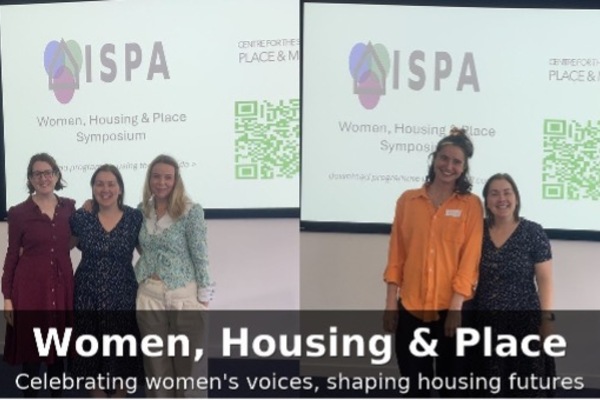On the 30th of November, Jenny Galbraith (University of Stirling) and Emma Harrison (University of Stirling) hosted a symposium titled ‘Doing Housing Research: Methods and Reality’ at the University of Stirling supported by the Housing Studies Association.
This symposium aimed to bring together researchers from both academic and non-academic fields of housing research to discuss the strengths and uses of different research paradigms in our work and the unvarnished reality of using these methods. There was also a careers panel midway through the day aimed at Early Career Researchers (ECR’s) to discuss the different career pathways for doing housing research inside and outside academia.
The first presentation of the day was by Dr Yoric Irving-Clarke (Chartered Institute of Housing) about the use of mixed methods designs in his PhD research. Yoric was able to gain a unique insight into his area of research through using mixed methods in the form of quantitative surveys and qualitative interviews. Whilst acknowledging the ‘paradigm wars’, Yoric presented a compelling argument for the use of mixed methods designs in housing research and noted that we have a lot of data available that remains unexplored. He ended with a discussion around the differences in conducting academic and non-academic research.
Next was a topical presentation from Jenny Galbraith (University of Stirling), who detailed her experiences of researching pathways to homelessness for Central and Eastern European migrants. Jenny’s research uses biographical interviews, photo elicitation and observations to research Central and Eastern European migrants’ experiences of homelessness in Scotland. In the initial phase of her research, Jenny spent a number of months observing in homelessness services and getting to know service users and she highlighted the importance of this in recruiting participants for the biographical interviews. Jenny also spoke of the challenges in adopting these methods, e.g. language barriers, and the benefits, e.g. treats participants as people who just happen to be homeless not ‘homeless people’.
The next part of the symposium consisted of a career panel in which three researchers from different sectors of housing discussed their experiences of careers in housing.
First in the panel was Zhan McIntyre who is currently employed as the Policy Lead in the SFHA (Scottish Federation of Housing Associations). Zhan detailed her ‘straight through’ career path in housing, going from an undergraduate degree to a Master’s degree and her employment in housing research leading up to her work with SFHA. Zhan then shared her experience of conducting research with members of the public, illustrating the need to approach participants instead of waiting for them to come to you. She highlighted the importance of being present in the community involved in the research and engaging with participants. One piece of advice she gave to those who attended was when they consider jobs: “Widen your scope and don’t be afraid to try different things”.
Next on the panel was Dr Lisa Garnham whose job role is a Public Health Research Specialist at Glasgow Centre for Population Health (GCPH). Lisa highlighted the benefits of a career in research outside of academia, such as a permanent contract and the ability to move between projects within GCPH. Lisa noted that route into her current role did not only come from her PhD but instead followed from projects she did alongside her PhD, such as being on a Children’s Panel for three years. When asked if she could give one piece of advice to ECR’s she replied that saying yes to additional projects can be invaluable, providing that it doesn’t become too much of a time commitment.
The final member of the panel was Dr Kim McKee who is a Senior Lecturer in Housing Studies at the University of Stirling. Kim gained her undergraduate, Masters and PhD before moving to St Andrews and earlier this year moving to the University of Stirling to take up a Senior Lecturer post. Kim advised that the best way to get through her PhD was to treat it like a 9-5 job and to maintain a work-life balance. Similar to Lisa, Kim also spoke about the importance of gaining different types of experience, such as teaching with the OU and editing for academic journals as well as gaining the PhD.
The careers panel ended with a discussion about the career opportunities for researchers in housing, particularly focusing on the provision of maternity leave (and family life overall) and flexible working patterns. Comparisons were drawn across the three areas of the housing sector.
After lunch we returned to the presentations where Katie Colliver (Heriot Watt University) presented her research examining whether national homelessness practices can be ethically justified and how normative concepts can impact homelessness policies. Katie interviewed 40 individuals whose work is in some way connected to homelessness policy in the UK. In order to engage policy makers Katie devised a tool in which participants ranked the ethical aims of enforcing homelessness policy. The use of this tool allowed policy makers to discuss the ethics of homelessness policy in a practical way that they could apply to their experience of their work. Katie noted that the tool worked differently when used with phone interviews, indicating that it might be better used in face-to-face interviews.
In the next session, Dr Steve Rolfe (University of Stirling) presented his experiences of conducting longitudinal research on a project examining the health and wellbeing of individuals engaging with social enterprise housing organisations. The data was collected through phone or face-to-face interviews with participants at three different time points over a year. Steve noted that longitudinal research has the advantage of being able to track the individual’s health over time, but it is not without obstacles. It was noted that people often did not answer the phone, or they changed their phone numbers, making it very difficult to contact them. However, people were more likely to engage with research if financial incentives were involved and were more likely to answer their phones if they received a text message first. Steve also gave useful advice on working with partner organisations. He explained that partner organisations were much more welcoming of research when they were made aware of the positive impacts of the research on their organisation.
Next, Johanna Jokio (University of Glasgow) presented her research using cluster analysis to examine tenure mix in Scotland. As the only statistician presenting at this symposium, she provided an interesting insight into the use of statistical modelling in housing research. After giving a history of the measures previously used to determine social composition, Johanna described her use of cluster analysis in her research. Through this method Johanna is able to determine whether areas with a higher mix of different tenure types (such as owners, social renters and private renters) are more likely to have higher levels of deprivation than homogenous areas.
Finally, Trudi Tokarczyk (University of Stirling) presented her research on the Immigration Acts 2014 and 2016 and the right to rent. As part of the creation of a ‘hostile environment’ to illegal immigrants, landlords were legally obliged to check potential tenants’ immigration documents before commencing their tenancy. Trudi worked on a project that aimed to interview housing providers and policy makers in England (where the legislation came into force) to determine how this legislation affected the rental climate. Trudi noted that the participation rate in this project was low, which she attributed to being in Scotland and remotely conducting research via phone in England. Trudi also illustrated the impact of ‘research fatigue’ on research participation. Another organisation was conducting a very similar piece of research just before Trudi’s research had started, meaning that people were less likely to participate in a similar research project.
This event provided an excellent opportunity for ECR’s, practitioners and academics to come together and discuss both the methods employed in housing research and also the career paths that are available in this area. Feedback from the event was very positive with attendees enjoying the informal discussions and opportunity for networking and discussing the realities of conducting research inside and outside academia and potential career trajectories. After the event a Facebook group titled ‘Housing Research Community’ was established to provide a platform to continue the discussions and provide informal support to housing researchers. The organisers are grateful to the Housing Studies Association for providing the funding to make this event possible.
More information on bursaries available for Housing Studies Association members







